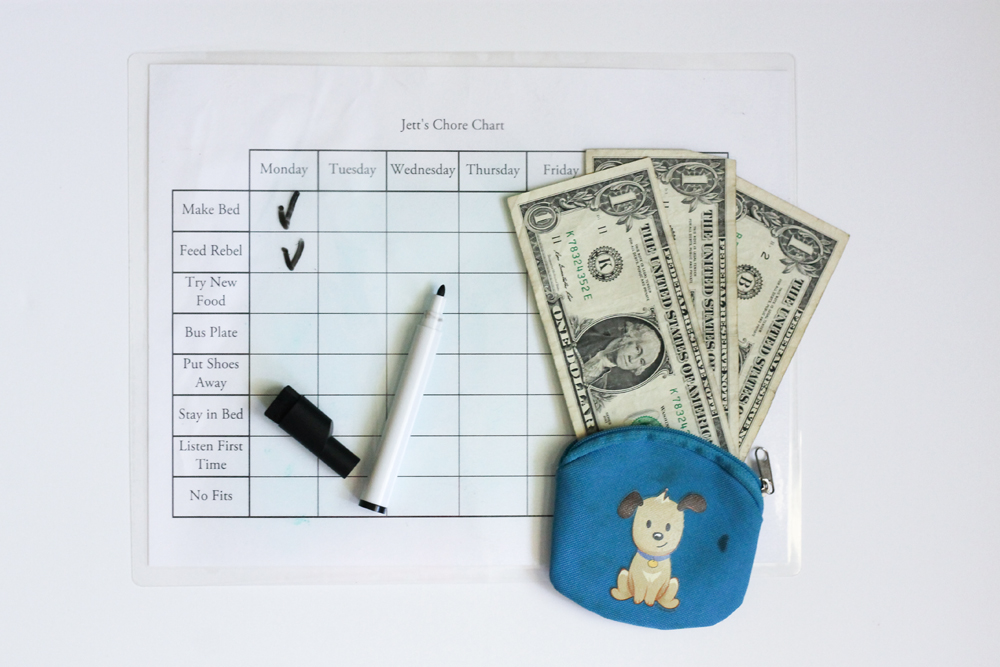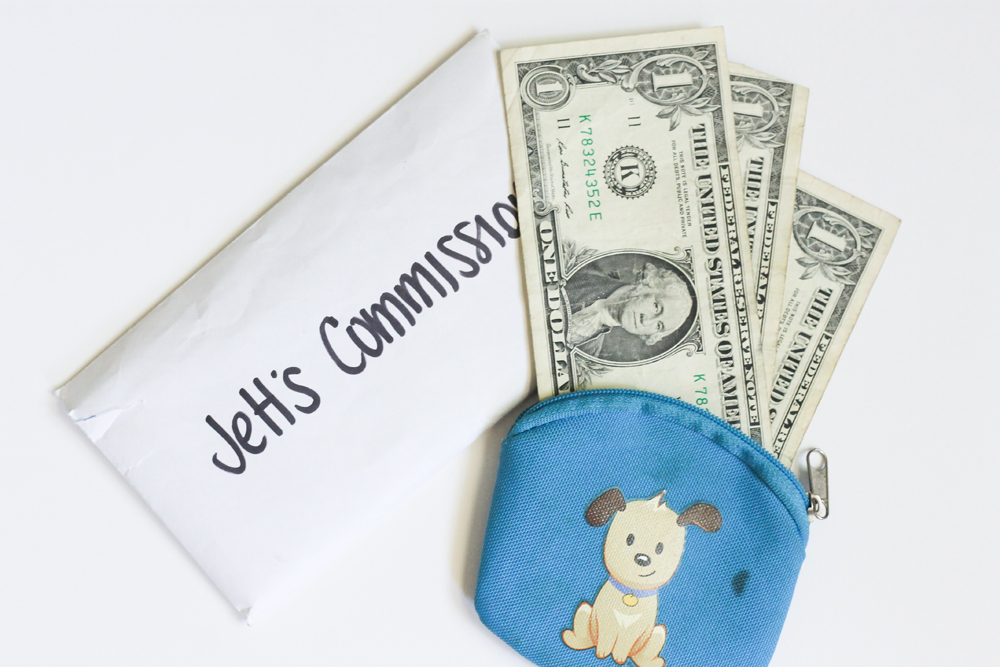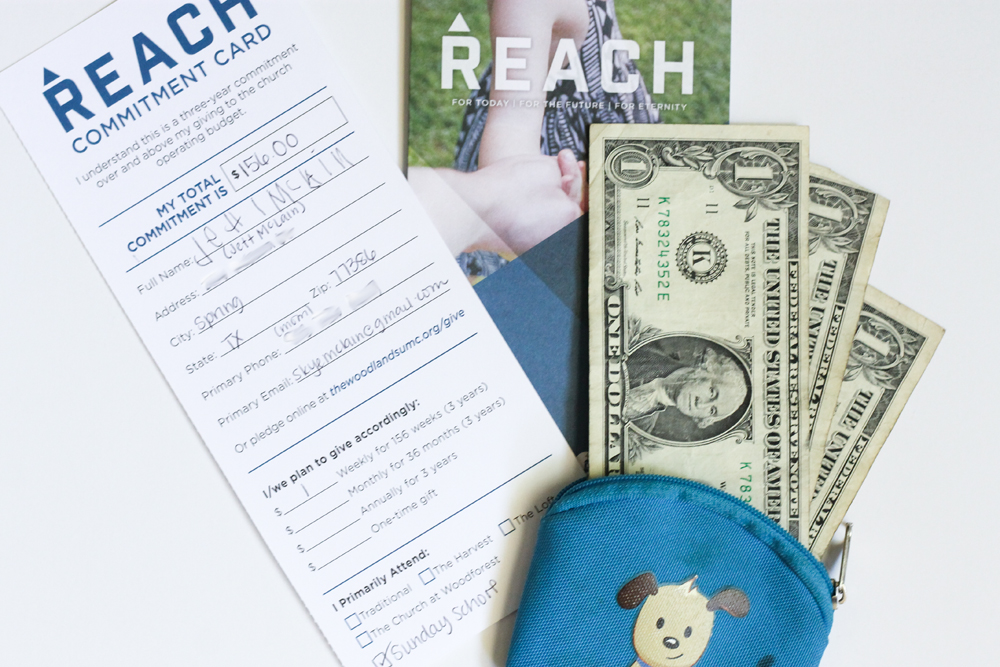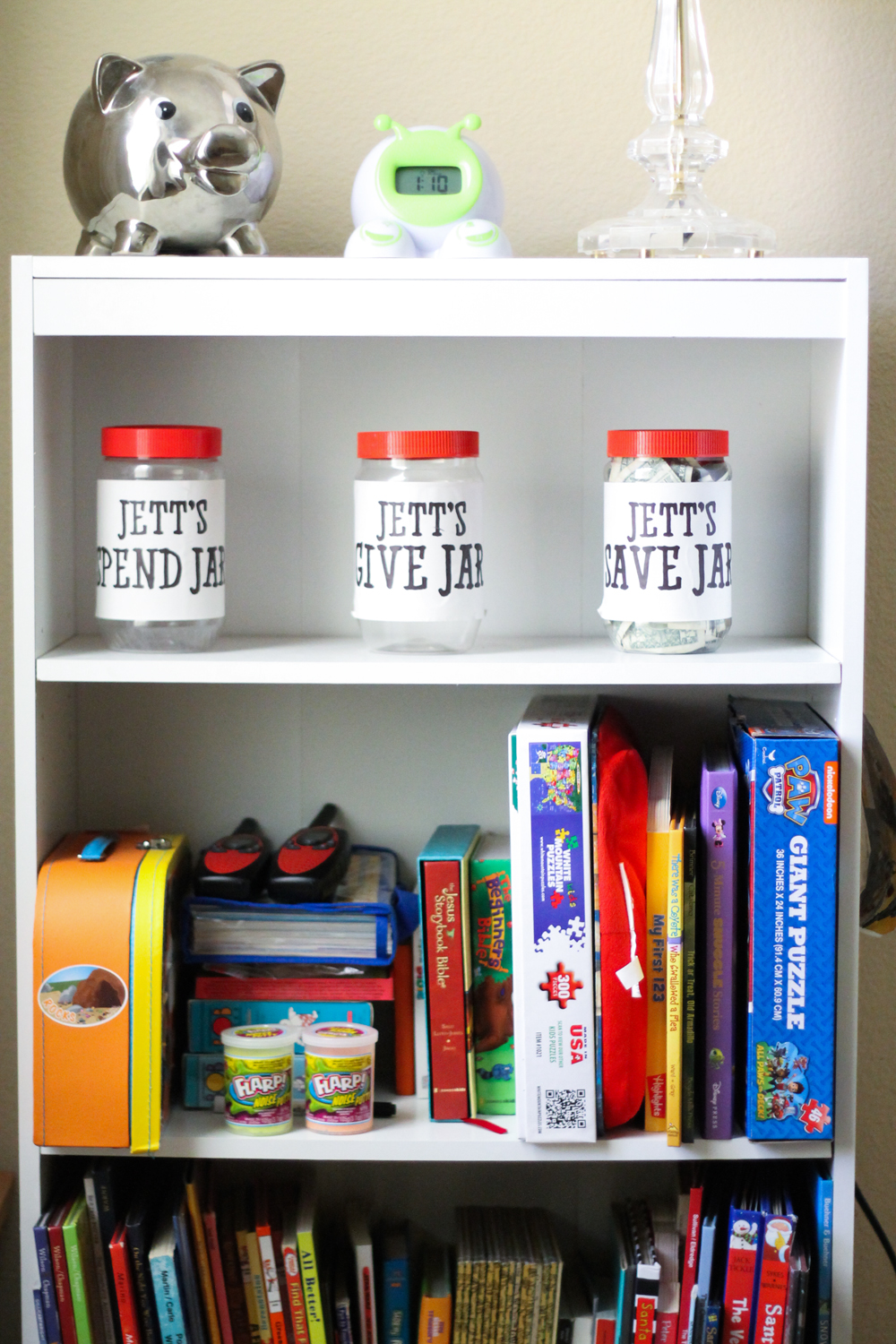In my opinion, it is never too late to start teaching kids about money! Since Jett was around 3 1/2, we have been working with him to teach him (very) basic money skills and it has really paid off, pun intended, for both him AND us! Here is how we have taught Jett to handle money!

Teaching Kids About Money
One thing that we really wanted to instill in Jett during our journey to becoming debt free was the value of money and the responsibility that came with having it.
1. Money comes from doing work.

From the ripe age of just 3.5 years old, Jett has had a chore chart, and it has been a game-changer for him and for us. It turns out that he is very motivated by money and when he doesn’t feel like doing the chores we have for him, a quick reminder that there is money tied to that will kick him into gear.
His chores are very simple and age appropriate – it is not like we ask him to vacuum the entire house every week or mow the yard. (But don’t think for a second that we won’t add that to his list one day… why do you think we had children? I KID!) In addition to having regular chores like putting his shoes away, taking his plate to the kitchen after dinner, and feeding the dogs, we also included behavioral markers like listening and doing what a grownup asks the first time, staying in bed at night (THIS RIGHT HERE FOLKS!!!!), and trying a new food every day.
There are certainly weeks where that chore chart is sparsely filled up – I mean he is only four after all. But when that happens, we give him ample opportunity to make things up on Saturdays before payday arrives on Sunday. He will do things like vacuum his bedroom, sweep out the garage, dust the TV cabinet, etc. He does a terrible job at these things, but that is hardly the point. The point is that he does them, and he sees that by doing work, he gets paid. Work = Money in his mind and that is incredibly important for grown-ups to know. Starting now just gives us a head start.
2. Giving should be the number one priority.

Each Sunday morning before church, we have payday. And trust me, he does NOT let me forget about it. We count up his check marks on his chore chart and I decide how much he is going to get paid depending on how many check marks he racked up during the week. I’m a softie, so 99% of the time it is $5/week. But if has had a particularly bad week at school or got out of bed a lot, I will deduct a dollar or two as needed. (We also usually talk about this on Saturday morning so that we can give him the chance to do some extra chores to make up for it).
The first thing we do is take $1 out, no matter what, to take to Sunday School. Even if he only makes $1 that week, that means that he has to sacrifice putting it in his Save Jar or Spend Jar. It must go to the church. This might seem a little harsh, but hear me when I say that even though he is highly motivated by the making of money, he is also a giver, meaning that most weeks I have to remind him that he doesn’t HAVE to give $2 or $3 at Sunday School, even though he usually wants to.
He has a little blue zip pouch that he got in an International Passports package once that is the perfect size for taking his money to church. That dollar goes directly from his commission into that zip pouch.

We also talked with him recently about the capital campaign we are having at our church for the next three years. We showed him our commitment card and talked about how much we were giving to help build new places for him to play and go for Sunday School and how it would also build Daddy a new office. We let him decide if he wanted to make a commitment or not (spoiler alert, he did) and how much. So we filled out the card and put it in the basket at church.
I think that this is SO important because right now, the money they give in Sunday School usually goes to help children in other churches and countries who need it. I BELIEVE THIS IS A GREAT CAUSE and we will likely help Jett by increasing his weekly commission when he turns five so he can do $1 for each – one for the capital campaign, one for the Sunday School mission. But I also deeply believe that it is really important for him to see the money he committed to give to the church IN ACTION with his very own eyes: watching the new buildings go up, seeing the remodeling start, etc., so that he can tie his giving with something that he will benefit from, and that will benefit many others who come through the halls of the church as well.
This is something that I believe a lot of adults struggle with – we give to the church but we never really see our money making waves in the lives of those it touches. I want to teach Jett NOW that every dollar matters and that no gift is too small.
3. Save up money for things you want to buy.

Right now, we have a picture of a Lego Jokermobile set taped to the outside of Jett’s Save Jar. It is hideous, and I am not sure if he will actually want it or not when the time comes, but the principle still stands: teach them to save up for things that they want to buy. As soon as we taped that ugly little car on his Save Jar, it flipped a switch in him so that every week, he was more motivated to get his chores done, and maybe work a little extra, to put money in his save jar to buy that car!
He has been saving for a few months and has more than enough money in there – now it is just time for us to take him to the Lego store to buy it. I am really interested to see what emptying that jar out and going to buy a toy with it that he will only play with for so long is going to make him feel. As an adult, I know that toys are only temporary and are only interesting for so long but I don’t expect him to understand that.
And then we will start all over again, filling up that save jar again! Here are some tips and things we have learned along the way for the save jars:
1. This applies to all the jars, but make sure your kid’s name is on them! It gives them a real sense of ownership to know that the money in those jars is something they have worked to earn.
2. Use clear, plastic jars. We have old peanut butter jars (the huge ones you get at Aldi), that we cleaned out. The fact that they can see inside and track their progress is exciting for them, rather than putting money in a piggy bank that they can’t see anymore. Once it is in there, it’s gone to them!
3. Pay your child in dollar bills. It doesn’t have to be $5 a week or whatever, maybe you start at $3. But paper money will fill up those jars a heck of a lot faster than quarters will and this will only excite them more to cram more money in there!
4. Money should be enjoyed.

So we have covered giving and saving; now for the really fun part (especially for me): spending! Out of the $5 Jett gets each week, he always gives $1, and then usually saves $2 and keeps $2 out for spending. And typically we do the same thing with our spending money each and every week.
Donuts and chocolate milk at church.
He puts his $2 (along with a quarter I give him since it is $2.25), in the little blue zip pouch along with his giving money but folded up separately. We have a cafe inside our church and the employees there know him now and talk to him when taking his order (not me) and look to him for payment (not me) and I think it really makes him feel very cool and grown up. (I mean, as cool and grown up as you can at that age!).
Here are some of the key lessons he is learning from this:
1. Responsibility: it is absolutely 100% his responsibility to keep up with that little blue zip pouch and the money inside. If he loses it (which it has been misplaced before), he knows that Mom + Dad are not going to replace it. He is still working on this of course, but its a great starting point for carrying a wallet one day.
2. Authority: he gets to decide what kind of donut he wants and whether he wants regular milk or chocolate milk. No, in the grand scheme of things, it’s not that big of a deal. But knowing that he has the authority to spend his money how he chooses is monumental.
3. Independence: that’s right, tiny human. Mom and Dad will not be responsible for paying for every little thing you want for the rest of your life. Muahahahaha. But seriously though, he is learning this lesson that if he wants a donut at church on Sunday, he is going to have to be the one that pays for it. It is small beans now, but in ten years when it is time to buy a car, he won’t look to us to purchase it for him. At least that is what we are going for!
4. How to order something: one side-lesson that he is getting from this process is how to respect those that are serving him in some way. He is learning that he needs to speak up, ask questions, ask for what he wants, and be kind and polite to the people who are waiting on him. It has always been a big tell for me when people are rude to servers – maybe I’m biased because I waited tables for a while – but in my book you are just overly polite and kind to people who are taking care of you.
We are definitely still in the beginning of how to teach Jett to handle his money and we only expect it to get more complicated from here. But we are giving him an awesome foundation to start on so that when bigger, more important decisions come up, like buying a car, paying for college, or going on a spring break trip with his friends, he will have an understanding of how to take care of those things himself without having to look to us!
What principles are you teaching your kids with money? If you loved this post, feel free to share on Pinterest using the image below or the share buttons at the bottom of the post!

